NEPHROUROLOGY PROCEDURES
It is mandatory to present your medical prescription to be able to carry out the tests.
If you are a pregnant woman or if you suspect that you may be so, or if you are breast-feeding,
please notify it to our health staff before performing any test.
All nuclear medicine tests involve the administration of a radiopharmaceutical
with a very low dose of radioactivity, which is eliminated in the following hours through the urinary or digestive routes.
The access of companions to the center is allowed in the case of children and patients who require special attention.
The rest of the patients can come accompanied but, as a health precaution during the pandemic and depending on
the capacity of the waiting room and the criteria of our staff, it is possible that
the companion cannot wait inside the center.
NEPHROUROLOGY PROCEDURES
It is mandatory to present your medical prescription to be able to carry out the tests.
If you are a pregnant woman or if you suspect that you may be so, or if you are breast-feeding,
please notify it to our health staff before performing any test.
All nuclear medicine tests involve the administration of a radiopharmaceutical
with a very low dose of radioactivity, which is eliminated in the following hours through the urinary or digestive routes.
The access of companions to the center is allowed in the case of children and patients who require special attention.
The rest of the patients can come accompanied but, as a health precaution during the pandemic and depending on
the capacity of the waiting room and the criteria of our staff, it is possible that
the companion cannot wait inside the center.
abc
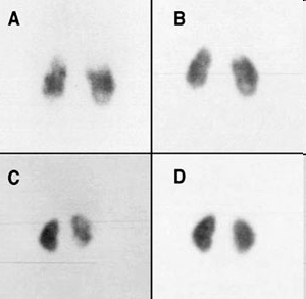
RENAL ANGIOSCINTIGRAPHY
RENAL AND QUANTIFIED RENAL SCINTIGRAPHY
RENAL TOMOSCINTIGRAPHY (SPET/SPET-TC)
DESCRIPTION: Evaluation of functioning renal mass. Evaluation of renal perfusion, if necessary. Detection of kidney damage of small size or difficult location, hard to evaluate in planar images.
PREPARATION: No previous preparation is necessary. No fasting is required. Good hydration is recommended.
INDICATIONS: Diagnosis of acute pyelonephritis. Evaluation of interstitial and reflux nephropathy. Quantification of the absolute and relative tubular function. Evaluation of renal morphology and renal malformations (horseshoe kidney). Diagnosis of a thromboembolic disease or renal infarction. Assessment of renal perfusion.
DURATION OF PROCEDURE: 3 hours.
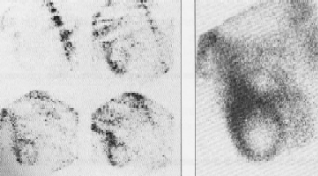
TESTICULAR ANGIOSCINTIGRAPHY
DESCRIPTION: Evaluation of testicular perfusion.
PREPARATION: No preparation is needed.
INDICATIONS: Evaluation of testicular irrigation. Differential diagnosis of spermatic cord twisting of other causes of inflammation or acute testicular pain.
DURATION OF PROCEDURE: 15 minutes.
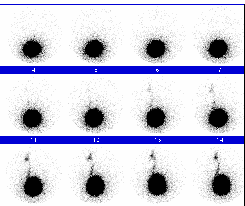
DIRECT CISTOSCINTIGRAPHY
DESCRIPTION: Assessment of the presence of reflux at vesicoureteral level.
PREPARATION: No fasting is required. Prophylaxis is performed with wide spectrum antibiotics (choice Augmentin 30 mg/kg/day), administered every 8 hours, for 2 days, from 12-24 hours before the scan. A bladder probe is to be placed in sterile conditions before the procedure. During the procedure, the patient sits in a special chair, with the pelvis and back supported to the gamma camera detector, located in a vertical position.
INDICATIONS: Detection of vesicoureteral reflux.
DURATION OF PROCEDURE: 20 minutes.
abc
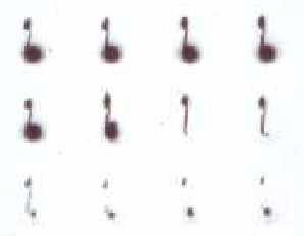
INDIRECT CISTOSCINTIGRAPHY
DESCRIPTION: Assessment of the presence of reflux at vesicoureteral level.
PREPARATION: A renogram with MAG-3 is performed 30-90 minutes before the cistoscintigraphy, without diuretic administration and with forced hydration before the renogram and between renogram and cistoscintigraphy. The patient must not pee between the renogram and the cistoscintigraphy. During the procedure, the patient sits in a special chair, with the pelvis and back supported to the gamma camera detector, located in a vertical position.
INDICATIONS: Detection of vesicoureteral reflux.
DURATION OF PROCEDURE: 2 hours.
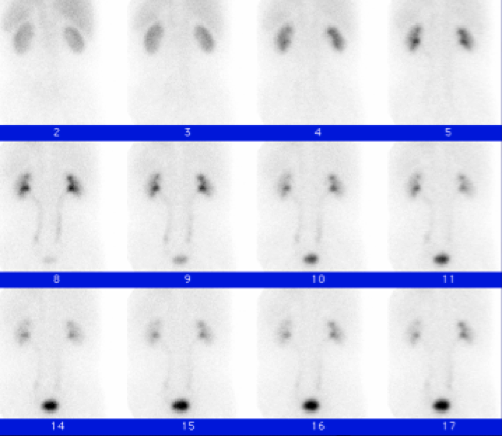
BASELINE ISOTOPE RENOGRAM
GLOMERULAR FILTRATION RATE ISOTOPE RENOGRAM
DESCRIPTION: Functional evaluation of the kidneys. Evaluation of renal perfusion and glomerular filtration. Evaluation of the dynamics of the urinary tract.
PREPARATION: The patient must hydrate with 200-250 ml of liquid and pee before the scan. In infants, the renogram is made just at the end of breastfeeding. Older children don’t need to fast and hydration varies according to age (50-250 ml).
INDICATIONS: Evaluation of renal functioning and the dynamics of the urinary tract. Individual functional study of each kidney. Evaluation of obstructive uropathy. Evaluation of perfusion and renal function. Diagnosis of vasculorrenal arterial hypertension (baseline and post-captopril renogram).
DURATION OF PROCEDURE: 30 to 180 minutes.
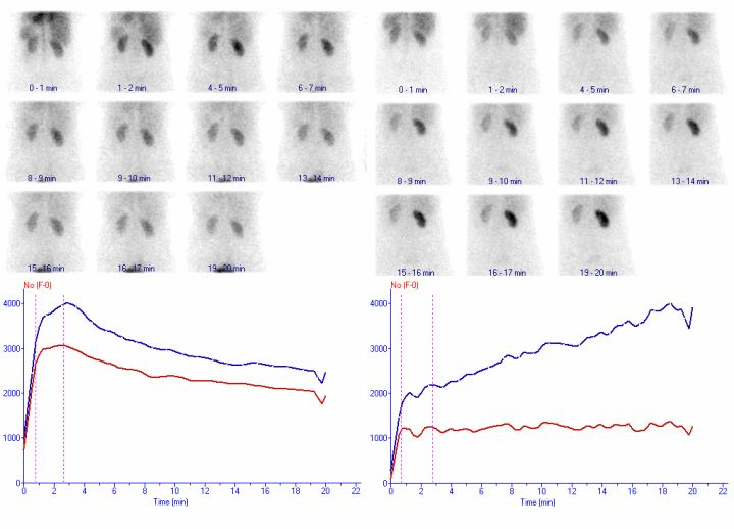
ANGIOTENSIN-CONVERTING ENZYME (ACE) INHIBITORS ISOTOPE RENOGRAM
CAPTOPRIL TEST
DESCRIPTION: The Captopril test is performed as part of the differential diagnosis test for vasculorenal high blood pressure, and for the evaluation of a possible renal uni or bilateral artery stenosis. It implies two procedures: abase study and a Captopril study, for the evaluation of the function of the kidneys, renal perfusion and glomerular filtration in both situations.
PREPARATION: The patient must hydrate with 200-250 ml of liquid and pee before the scan. In infants, the renogram is made just at the end of breastfeeding. Older children don’t need to fast and hydration varies according to age (50-250 ml). After consultation with the prescribing physician, ACE medication must be withdrawn 6 days before the procedure. It is also advisable to stop other medications (beta blockers: 2 days before, limit antagonists: 24 hours before, diuretics: 2 days before).
INDICATIONS: Diagnosis of vasculorenal arterial hypertension (baseline and post-captopril renogram).
DURATION OF PROCEDURE: 2 days.
abc
sin
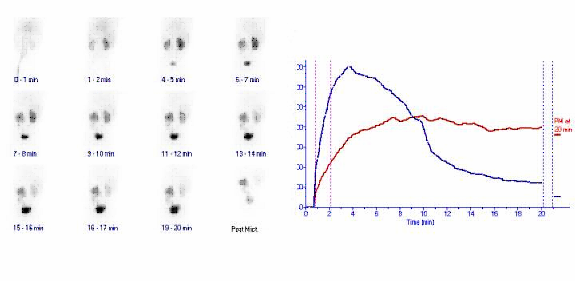
MAG3 DIURETIC AND
POSTMICCIONAL RENOGRAM
DESCRIPTION: Evaluation of renal functioning and the excretory dynamics of the urinary tract.
PREPARATION: The patient must hydrate with 200-250 ml of liquid and pee before the scan. In infants, the renogram is made just at the end of breastfeeding. Older children don’t need to fast and hydration varies according to age (50-250 ml). In the event of slow urinary excretion or excretory tract ectasia, furosemide is administered at 15 minutes (0.5 mg/kg) and 30 minutes (0.5 mg/kg) intervals, and an immediate post-imaging image is made during or after the renogram.
INDICATIONS: Individual functional study of each kidney. Evaluation of obstructive uropathy.
DURATION OF PROCEDURE: 1 a 3 hours.
sin
RENAL ANGIOSCINTIGRAPHY
RENAL AND QUANTIFIED RENAL SCINTIGRAPHY
RENAL TOMOSCINTIGRAPHY (SPET/SPET-TC)
DESCRIPTION
Evaluation of functioning renal mass. Evaluation of renal perfusion, if necessary. Detection of kidney damage of small size or difficult location, hard to evaluate in planar images.
PREPARATION
-
No previous preparation is necessary.
-
No fasting is required.
-
Good hydration is recommended.
INDICATIONS
-
Diagnosis of acute pyelonephritis.
-
Evaluation of interstitial and reflux nephropathy.
-
Quantification of the absolute and relative tubular function.
-
Evaluation of renal morphology and renal malformations (horseshoe kidney).
-
Diagnosis of a thromboembolic disease or renal infarction.
-
Assessment of renal perfusion.
DURATION OF PROCEDURE
2 hours
TESTICULAR ANGIOSCINTIGRAPHY
DESCRIPTION
Evaluation of testicular perfusion.
PREPARATION
No preparation is needed.
INDICATIONS
-
Evaluation of testicular irrigation.
-
Differential diagnosis of spermatic cord twisting of other causes of inflammation or acute testicular pain.
DURATION OF PROCEDURE
15 minutes.
DIRECT CISTOSCINTIGRAPHY
DESCRIPTION
Assessment of the presence of reflux at vesicoureteral level.
PREPARATION
-
No fasting is required.
-
Prophylaxis is performed with wide spectrum antibiotics (choice Augmentin 30 mg/kg/day), administered every 8 hours, for 2 days, from 12-24 hours before the scan.
-
A bladder probe is to be placed in sterile conditions before the procedure.
-
During the procedure, the patient sits in a special chair, with the pelvis and back supported to the gamma camera detector, located in a vertical position.
INDICATIONS
Detection of vesicoureteral reflux.
DURATION OF PROCEDURE
20 minutes.
INDIRECT CISTOSCINTIGRAPHY
DESCRIPTION
Assessment of the presence of reflux at vesicoureteral level.
PREPARATION
-
A renogram with MAG-3 is performed 30-90 minutes before the cistoscintigraphy, without diuretic administration and with forced hydration before the renogram and between renogram and cistoscintigraphy.The patient must not pee between the renogram and the cistoscintigraphy.
-
During the procedure, the patient sits in a special chair, with the pelvis and back supported to the gamma camera detector, located in a vertical position.
INDICACIONES
Detection of vesicoureteral reflux.
DURATION OF PROCEDURE
2 hours.
BASELINE ISOTOPE RENOGRAM
GLOMERULAR FILTRATION RATE
ISOTOPE RENOGRAM
DESCRIPTION
-
Functional evaluation of the kidneys.
-
Evaluation of renal perfusion and glomerular filtration.
-
Evaluation of the dynamics of the urinary tract.
PREPARATION
-
The patient must hydrate with 200-250 ml of liquid and pee before the scan.
-
In infants, the renogram is made just at the end of breastfeeding.
-
Older children don’t need to fast and hydration varies according to age (50-250 ml).
INDICATIONS
- Evaluation of renal functioning and the dynamics of the urinary tract.
- Individual functional study of each kidney.
- Evaluation of obstructive uropathy.
- Evaluation of perfusion and renal function.
- Diagnosis of vasculorrenal arterial hypertension (baseline and post-captopril renogram).
DURATION OF PROCEDURE
30 to 180 minutes.
ANGIOTENSIN-CONVERTING ENZYME (ACE)
INHIBITORS ISOTOPE RENOGRAM
CAPTOPRIL TEST
DESCRIPTION
The Captopril test is performed as part of the differential diagnosis test for vasculorenal high blood pressure, and for the evaluation of a possible renal uni or bilateral artery stenosis. It implies two procedures: abase study and a Captopril study, for the evaluation of the function of the kidneys, renal perfusion and glomerular filtration in both situations.
PREPARATION
-
The patient must hydrate with 200-250 ml of liquid and pee before the scan.
-
In infants, the renogram is made just at the end of breastfeeding.
-
Older children don’t need to fast and hydration varies according to age (50-250 ml).
-
After consultation with the prescribing physician, ACE medication must be withdrawn 6 days before the procedure.
-
It is also advisable to stop other medications:
-
Beta blockers: 2 days before
-
Limit antagonists: 24 hours before
-
Diuretics: 2 days before
-
INDICATIONS
Diagnosis of vasculorenal arterial hypertension (baseline and post-captopril renogram).
DURATION OF PROCEDURE
2 days.
MAG3 DIURETIC AND
POSTMICCIONAL RENOGRAM
DESCRIPTION
Evaluation of renal functioning and the excretory dynamics of the urinary tract.
PREPARATION
-
The patient must hydrate with 200-250 ml of liquid and pee before the scan.
-
In infants, the renogram is made just at the end of breastfeeding.
-
Older children don’t need to fast and hydration varies according to age (50-250 ml).
-
In the event of slow urinary excretion or excretory tract ectasia, furosemide is administered at 15 minutes (0.5 mg/kg) and 30 minutes (0.5 mg/kg) intervals, and an immediate post-imaging image is made during or after the renogram.
INDICATIONS
-
Individual functional study of each kidney.
-
Evaluation of obstructive uropathy.
DURATION OF PROCEDURE
1 to 3 hours.

SIMM MOLECULAR, S.L.U. belongs to the ATRYS Group
ATRYS-SIMM IRLA Center
Josep Irla i Bosch Street, 5, Buildong 2
Barcelona 08034, Catalonia, SPAIN
Phone (+34) 93 204 6439
ATRYS-SIMM SJD Center
Santa Rosa Street, 39, Pediatric Cancer Center Barcelona
Esplugues de Llobregat 08950, Catalonia, SPAIN
Phone (+34) 93 254 0470
FAX: (+34) 93 204 9641 · EMAIL: info.simm@atryshealth.com
In ATRYS-SIMM your personal data is treated according to the principles and rights included in the Spanish laws GDPR 2016/679 of April 27th, 2016 and LOPDGDD 3/2018 of December 5th, 2018.
You can excercise your rights by contacting us by email to protecciondatos-sp@atryshealth.com.
SIMM MOLECULAR, S.L.U. belons to the ATRYS Group
ATRYS-SIMM IRLA
Josep Irla i Bosch Street, 5, Building 2
Barcelona 08034, Catalonia, SPAIN
Phone (+34) 93 204 6439
ATRYS-SIMM SJD
Santa Rosa Street, 39
Esplugues de Llobregat 08950, Catalonia, SPAIN
Phone (+34) 93 254 0470
FAX: (+34) 93 204 9641
E-MAIL: info.simm@atryshealth.com
At ATRYS-SIMM your personal data is treated in accordance with
the principles and rights contained in the GDPR law 2016/679 of
April 27, 2016 and in the LOPDGDD law 3/2018 of December 5, 2018.
You can exercise your rights by contacting us by
email to protecciondatos-sp@atryshealth.com.